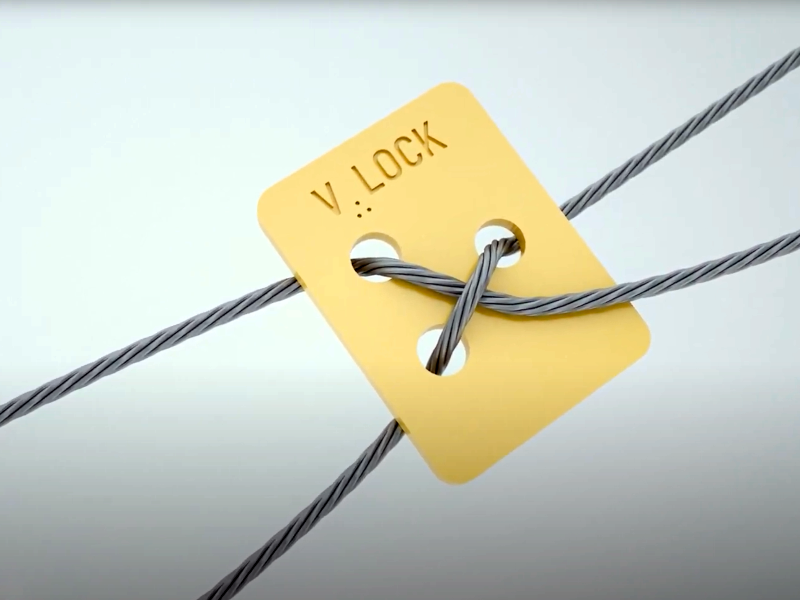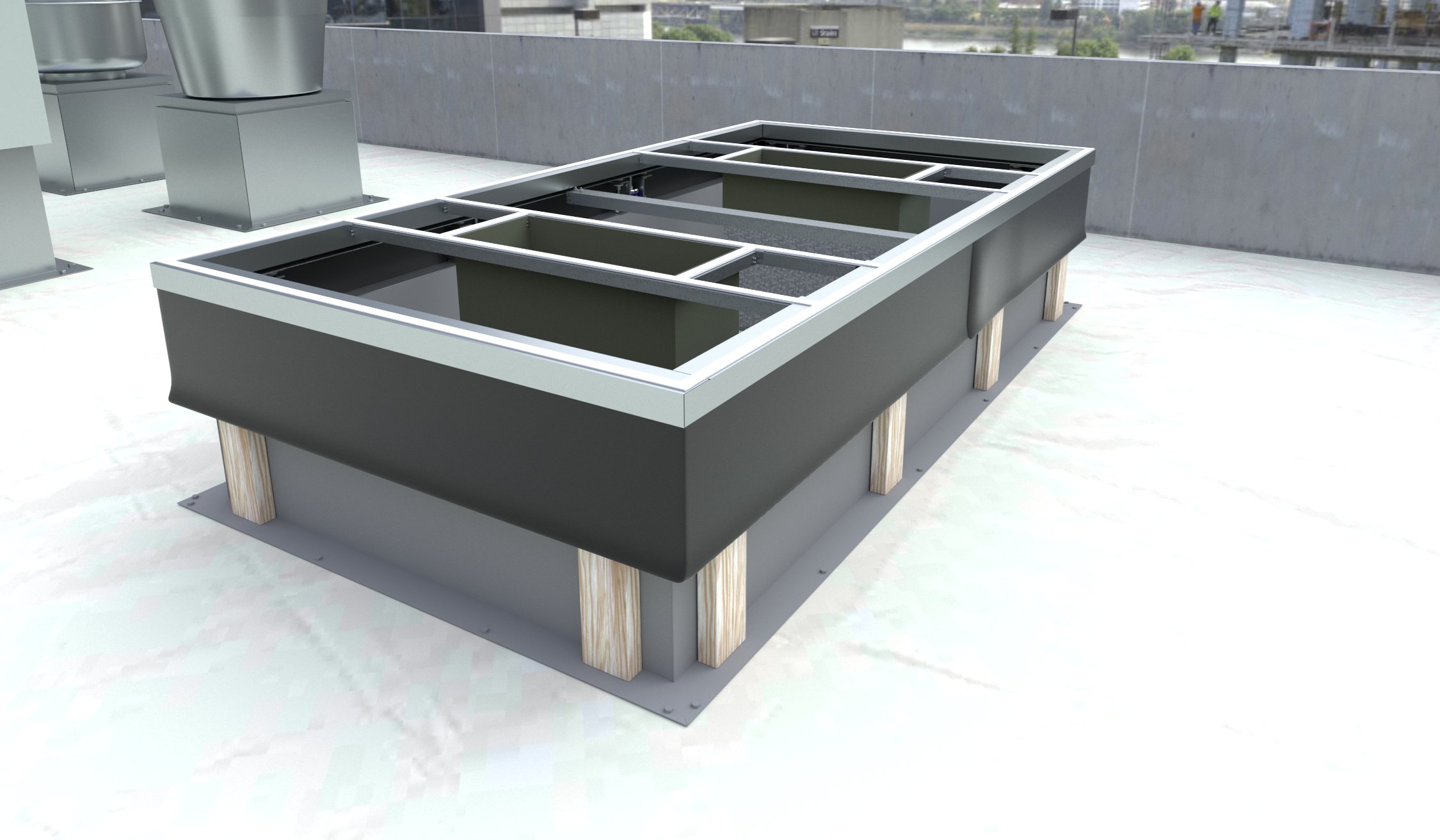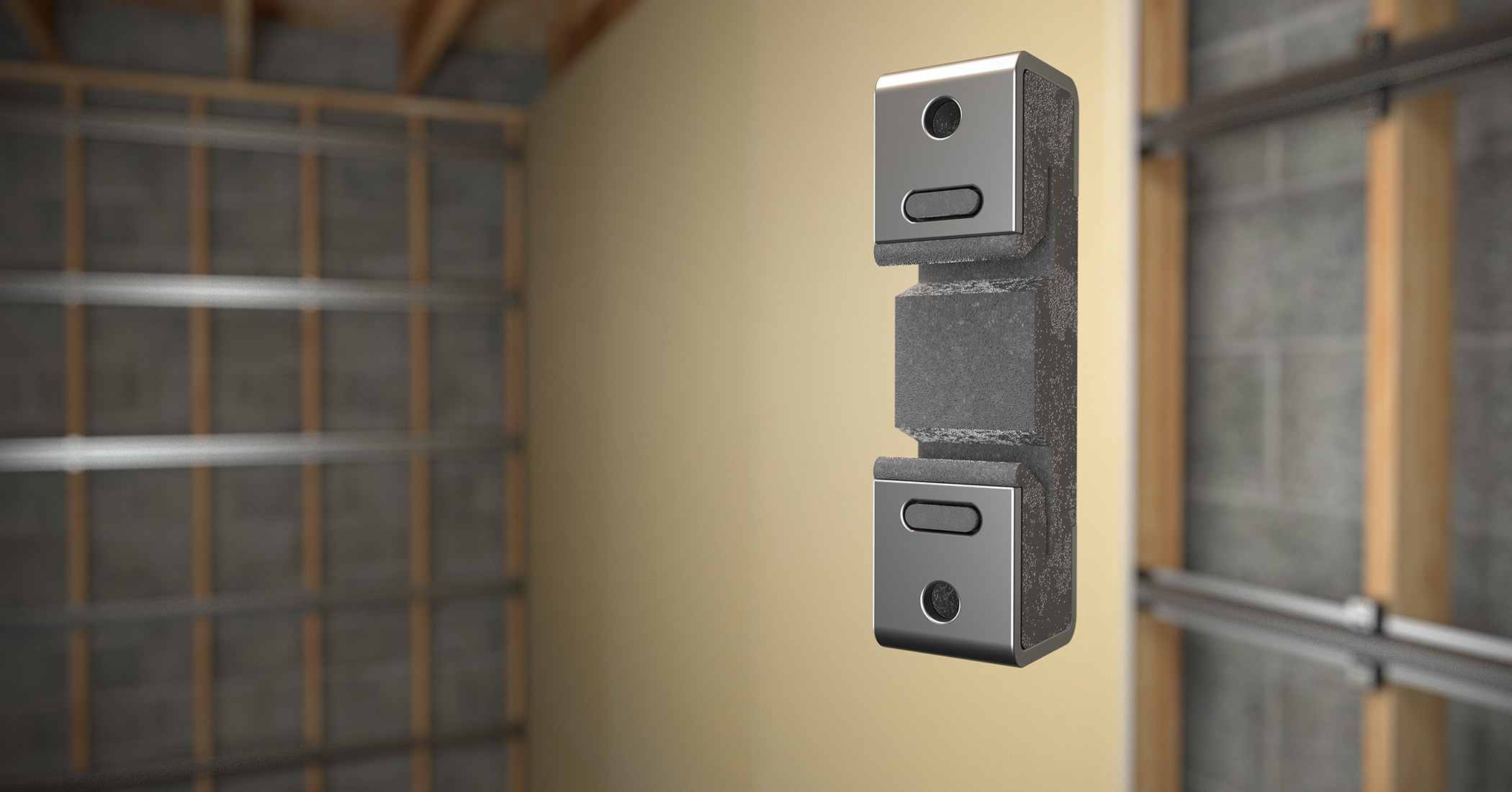A step above: Retrofit of existing stair nosings
By Tim Brennan
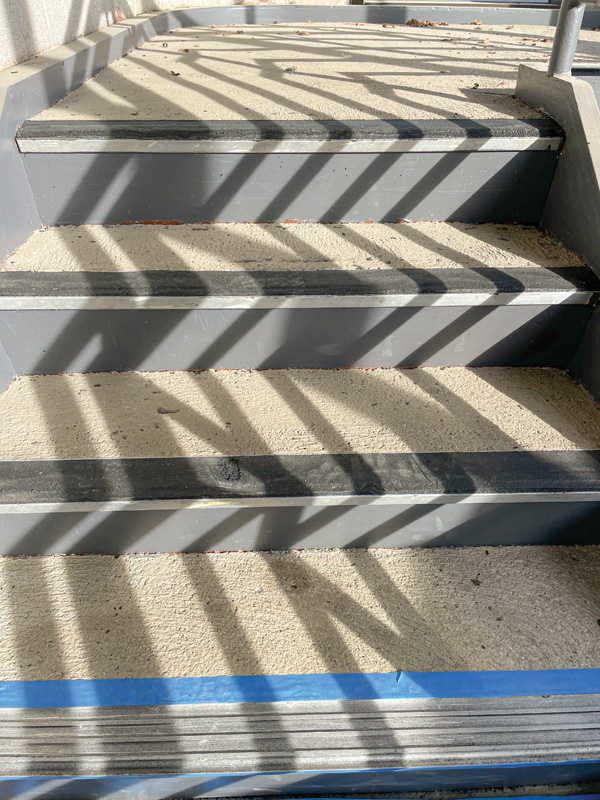
In today’s fast-paced world, people are always on the move, often hurrying or pacing around. This hurried lifestyle can lead to actions such as dashing up or down a set of stairs. The conditions of the stairs can greatly affect safety in these instances; if the steps are worn, uneven, or poorly lit, the risk of slipping or tripping increases. A moment of distraction or haste can result in serious accidents. This is why when Michigan Innovation Headquarters (MI-HQ) renovated a former Eastern Michigan University College of Business building to house University of Michigan Medicine (Michigan Medicine) facilities, they paid as much attention to the stairs in the parking garage as they did to the patient-facing areas inside the building.
When fully operational, the Ypsilanti facility will serve 150 or more patients daily. In addition to the three floors for Michigan Medicine, there will be several floors for Mi-HQ, with multiple labs catering to biotech, robotics, cell chemistry, and other emerging industries. While much of the renovation is centered on the customer- or patient-facing portion of the building, many of those patients will likely access the parking garage, so MI-HQ is also bringing the parking garage up to code, including extensive repairs to the west stairs.
Repair solutions
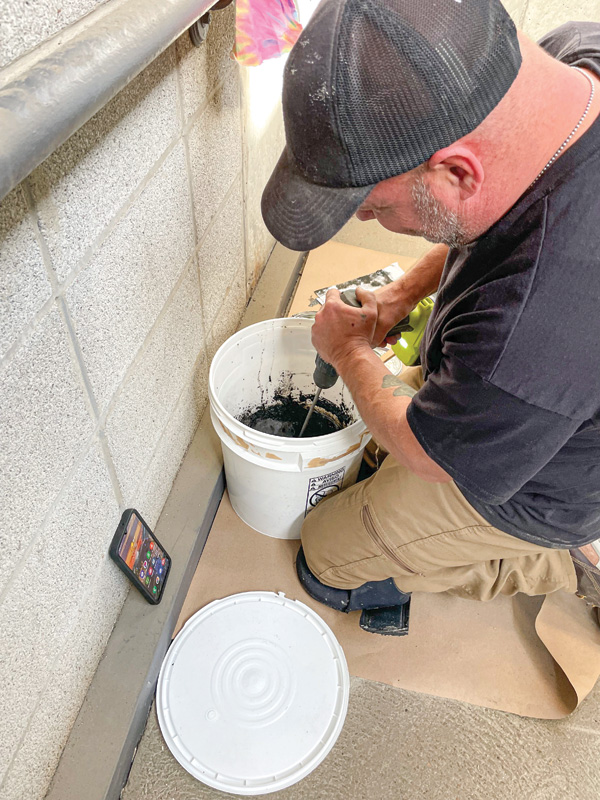
The garage was initially constructed in 1990, and the west stairwell was the only one with significantly degraded stair nosings. A thorough inspection before starting the repair process did not reveal any clues as to what caused the damage to the stairs.
Non-slip stair nosings and treads come in several forms and typically rely on an abrasive material, usually silicon carbide, mixed with epoxy to provide a slip-resistant leading edge for each step. The abrasive material is factory-applied to a depression along the leading edge of a manufactured tread profile. Aluminum nosing profiles may be designed to be embedded into the concrete step while it is being formed. Surface-applied rubber or aluminum profiles are also available for adhesive installation at the step after the concrete has cured and dried sufficiently. The abrasive materials significantly increase the coefficient of friction, and thus the gripping force, to decrease the likelihood that someone might slip on the surface, even when wet.
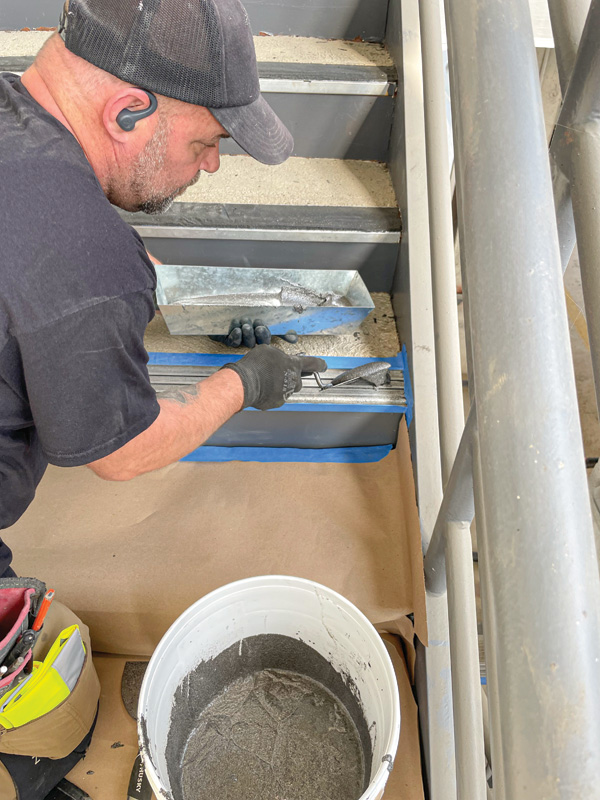
The building owner initially considered purchasing new aluminum nosings to replace those with missing grit, but at $70 each or more, that quickly exceeded their planned expenditure. The flooring contractor involved in the repair of nosings identified a field-applied abrasive product consisting of a three-part mixture. This product is intended for refilling and repairing aluminum treads in both indoor and outdoor applications and exhibits resistance to solvents, chemicals, and water. It reportedly meets or exceeds the resistance standards set by various regulatory agencies, including OSHA, ADA, ASTM, ANSI, and UL-140. Additionally, this product is designed to retrofit nosings from different manufacturers to ensure compliance with resistance standards.
After discussions with the manufacturer, a single pail of the newly developed material was ordered for evaluation. This was intended to assess ease of installation, coverage rates, and overall product quality. Each kit includes a canister of the two-part epoxy mixtures in the exact proportions required, the abrasive grit mixture, a drill mixing tool, a plastic applicator to help guide the mixture into the aluminum channels, and detailed instructions.
The first step of the process was removing the loose abrasive material from the steps to be repaired. This was accomplished by scraping the damaged abrasive material from the aluminum housings or using a wire brush, removing as much of the original abrasive as possible. After taping off areas around those needing repairs, the flooring installer thoroughly mixed the materials and began at the topmost step. He scooped ample mixture onto the aluminum substrate and worked it into the channels with his trowel. He then smoothed the horizontal surface and worked the mixture onto the leading edge to ensure it was well-coated. He found that a corner trowel tool worked well for placing material along the leading edge and smoothing it. The directions stated the repaired stairs should be ready for foot traffic in about 24 hours, but the flooring installer cordoned them off for 48 hours. He returned the next day to check on them but gingerly traversed the stairs without stepping on the repaired sections.
Finished result
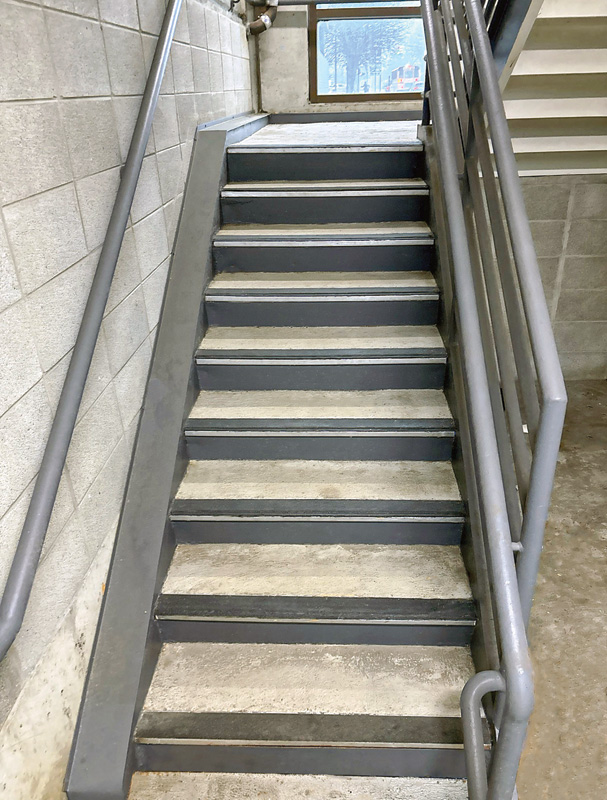
Each kit is intended to cover 14 m (45 ft) of nosing that is 0.07 mm (3 in.) wide and filled to a depth of 4.7 mm (0.1874 in.). Mi-HQ initially bought five buckets but returned one unopened after finishing the project. In total, the flooring contractor repaired 28 steps. The cost for the four buckets was about $600, which was more cost-effective compared to the initial estimate of $70 per step for replacing the entire nosing. Additionally, replacing all the nosing would have required more effort and time.
As the new tenants begin populating the newly refurbished building, they will notice the new paint, flooring, lighting, and equipment and furnishings. With their non-slip properties and newly refurbished steps, the parking garage stairs will continue to make every step safe.
Author
Tim Brennan is the national sales manager for Wooster Products. For more than 100 years, they have manufactured non-slip stair treads, nosings, tapes, coatings and more for commercial and industrial applications. He can be reached at tim@wooster-products.com or 800-321-4936.
Key Takeaways
Michigan Innovation Headquarters (MI-HQ) prioritized stair safety during the renovation of a former Eastern Michigan University building to house Michigan Medicine facilities. As part of the project, MI-HQ focused on repairing the west parking garage stairs, which had degraded stair nosings. They used a field-applied abrasive product to refurbish 28 steps. The renovated stairs, now non-slip, will ensure safety for the daily influx of patients and tenants in the new facility.



